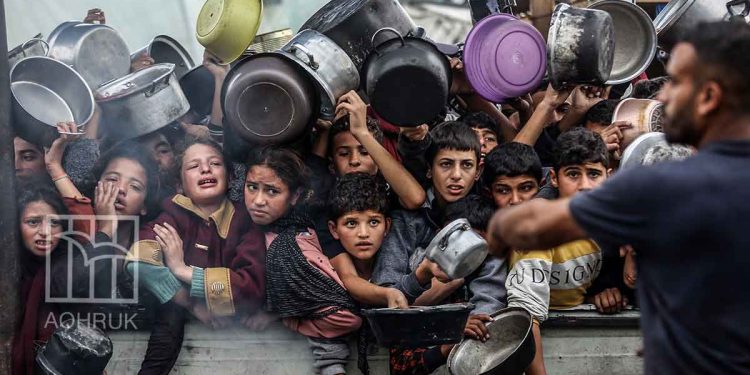The Israeli blockade imposed on the Gaza Strip has entered a critical and alarming phase since 2 March, significantly worsening the already dire humanitarian crisis. Over two million Palestinians, most of them women and children, are now witnessing severe hunger, disease, and shortages of clean water and healthcare.
The Commissioner-General of the United Nations Relief and Works Agency for Palestine Refugees (UNRWA), Philippe Lazzarini, issued a statement on X (formerly Twitter) addressing the humanitarian crisis in Gaza. In his post, he expressed deep concern over the deteriorating conditions, highlighting that hunger is spreading and worsening, describing it as “deliberate and man-made.”
He emphasized that Gaza has become a “land of despair,” with two million people, mostly women and children, being subjected to collective punishment.
Lazzarini also noted that the wounded, the ill, and the elderly are being denied medicines and healthcare. He warned that humanitarian aid is being used as a bargaining chip and a weapon in the ongoing conflict.
He noted that humanitarian organisations, including UNRWA, have thousands of life-saving aid trucks ready to enter Gaza, but warned that “many essential supplies are close to expiry.” He emphasised that “humanitarian aid is being used as a bargaining chip and a weapon in this war.”
What is unfolding in Gaza cannot be viewed as a mere by-product of war. It is the result of a deliberate policy aimed at exhausting civilians and depriving them of their most basic rights, denying the sick access to treatment, starving children, and obstructing access to drinking water. These actions have been documented in reports by international human rights organisations and are among the most egregious forms of collective punishment.
Earlier this month, Juliette Touma, UNRWA’s Director of Communications, warned that Gaza is on the brink of “catastrophic levels of hunger”, pointing out that “infants and children are going to bed hungry” amid a severe shortage of basic supplies.
International reports have indicated that the people of Gaza have yet to recover from the previous wave of hunger; a crisis directly linked to a year-and-a-half of restricted aid entry. This prolonged deprivation has pushed hundreds of thousands of impoverished families to the brink of famine. According to the World Bank, the poverty rate in Gaza has reached an unprecedented level, affecting virtually the entire population.
The continued closure of crossings and the obstruction of food and medical supplies constitute a clear violation of the Geneva Conventions, which explicitly prohibit the use of starvation as a method of warfare. The manipulation of humanitarian aid as a political tool places the occupying power in direct violation of international law and makes it legally accountable for the catastrophic consequences endured by the civilian population.
However, this situation has moved beyond collective punishment or grave breaches of the laws of war. It now meets the legal threshold for genocide. Under the 1948 United Nations Convention on the Prevention and Punishment of the Crime of Genocide, the “deliberate infliction on a national, ethnic, racial or religious group of conditions of life calculated to bring about its physical destruction in whole or in part” constitutes an act of genocide.
The Israeli occupation’s deliberate denial of access to water, food, and medicine, paired with widespread targeting of civilians and civilian infrastructure, signals a clear intent to cause destruction to an entire population group. The ongoing, comprehensive blockade of Gaza, effectively turning the territory into a site of slow death, constitutes an act of genocide under international law.
The lifting of the blockade and the unconditional entry of essential supplies is no longer solely a humanitarian demand; it is now a pressing legal and moral obligation, essential to halting this mass atrocity and preserving what life remains in the Gaza Strip.


























